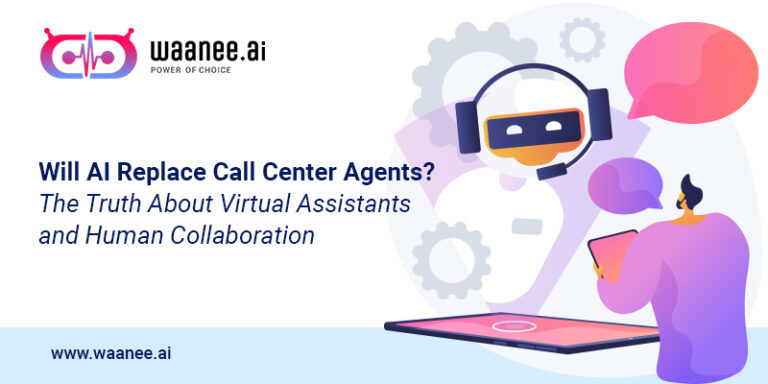
-
Waanee AI Labs
View All »

Get The Latest
How to Build an Effective QA Framework for Insurance / BFSI Contact Centers
Read More »Voice of Customer Analytics: Turning Conversations into Better Products
Read More »Step-by-Step Guide to Migrating from Legacy IVR to Agentic IVR
Read More » - Blog
Will AI Replace Call Center Agents? The Truth About Virtual Assistants and Human Collaboration
Posted by Vishal Vanwari, on 19 May, 2025 11:30 AM

In the fast-changing technology environment of today, artificial intelligence has emerged as a force of change across various industries. One industry going through major disruption is customer service, especially call centers. With developments in virtual assistants, chatbots, and AI-driven voice systems, many are asking: Will AI one day replace human call center representatives altogether? The answer is more complicated than a simple yes or no.
The Rise of AI in Customer Service
AI has progressed greatly in customer service solutions. Virtual assistants can now respond to simple questions, complete basic transactions, and even sense customer emotions by analyzing voices. JPMorgan Chase has, for instance, introduced AI programs that automate hours of work through document analysis and extraction of crucial data points. American Express firms, on the other hand, utilize AI to improve their customer service functions with predictive analytics and customized recommendations.
These technological advances bring undeniable benefits. AI systems never need breaks, can handle multiple inquiries simultaneously, and maintain consistent performance regardless of call volume or time of day. They excel at retrieving information instantly and can be scaled up or down based on demand without the complexities of human staffing.
The Limitations of Current AI Systems
Although possessing remarkable capabilities, current AI systems continue to have tremendous challenges in call centers. Though excellent at managing clear-cut, predefined situations, they are weak with complex situations needing empathy, analytical thinking, or innovative problem-solving.
Multifaceted customer problems generally entail emotional underpinnings that cannot be entirely handled by AI. As customers are agitated, flustered, or distressed, human agents have the ability to discern fine verbal intonations and respond based on those sensitivities. Modern AI technologies may recognize emotions but can never genuinely empathize nor develop true rapport.
Moreover, most customer service situations involve judgment decisions according to company policies that could have exceptions or special considerations. Human representatives can balance factors in aggregate and make decisions that weigh customer satisfaction against business needs, a finely nuanced skill that is still difficult for AI.
The Emerging Hybrid Model
Instead of wholesale substitution, what is emerging is a hybrid model in which AI and human agents collaborate to provide better customer experiences. This model capitalizes on the best of both:
AI processes routine queries– Virtual assistants facilitate straightforward, high-volume tasks such as checking account balances, password recovery, and low-level troubleshooting, taking human agents out of mundane work.
Humans address knotty problems– When situations call for judgment, empathy, or out-of-the-box thinking, calls are automatically routed to human agents who infuse these uniquely human abilities into the conversation.
AI powers human capabilities– As human agents handle calls, they get real-time support from AI systems that provide solution suggestions, access relevant data, and even analyze customers’ sentiments to assist in driving conversations.
Firms that adopt this hybrid solution have seen significant results. To illustrate, one of the big telcos saw that the installation of AI-enabled assistants for its human agents decreased call handling times by 25% while concurrently increasing customer satisfaction scores.
The Future of Call Center Work
As the capabilities of AI increase, the nature of call center work will inevitably change. Instead of elimination, we can expect transformation of the job. Future call center agents will require different skills than those of today, with greater emphasis on problem-solving, emotional intelligence, and interaction with AI systems.
This transformation opens up possibilities for call center professionals to build more fulfilling careers. With routine work automated, agents can concentrate on higher-value interactions that truly need human touch. The future call center agent could become more of a “customer experience specialist,” with greater knowledge and deeper problem-solving skills.
Preparing for the Future
For call center executives, the formula for success isn’t either human or artificial intelligence, but blending both thoughtfully. It needs:
- Wise implementation: Leveraging AI in areas where it can be value-added, maintaining human-to-human interactions where human touch counts most.
- Up-skilling existing staff: Committing to training sessions that assist agents in building those skills they would need to flourish with AI solutions.
- Workflow redesigning: Designing seamless handoffs between human agents and AI to provide unified customer experiences.
Conclusion
The question is not if AI will displace call center agents, but how it will reshape their roles and enhance their performance. Solutions provided by Waanee AI are designed to achieve this balance by enhancing call quality monitoring, capturing conversations effectively, and identifying key insights beyond simple sentence matching. With such advancements, businesses can elevate customer satisfaction while empowering their human agents to excel in complex, high-value interactions. The future lies in synergy — blending AI’s precision with human empathy to create smarter, more effective customer service operations.
Revolutionize CX
with AI power
Delivers personalized interactions and immediate, data-driven solutions powered by AI, transforming customer experiences.

We use cookies!
We use cookies to ensure that we give you the best experience on our website.
By continuing to use this site, you accept our use of cookies. Learn more
 Recruit Industries Agents
Recruit Industries Agents Build Your Agent
Build Your Agent Improve Self Service
Improve Self Service Employee Experience
Employee Experience Sales and Cross Sales
Sales and Cross Sales Calling Script
Calling Script Integration & APIs
Integration & APIs Auto Summarization
Auto Summarization Conversational Intelligence
Conversational Intelligence Sentiment Analytics
Sentiment Analytics Auto QA
Auto QA Net Promoter Score
Net Promoter Score